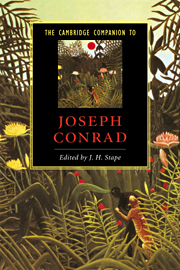8 - The late novels
Published online by Cambridge University Press: 28 May 2006
Summary
Until comparatively recently, Conrad's late novels have suffered from critical neglect and undervaluation. In the 1950s, Douglas Hewitt, Thomas C. Moser, and Albert J. Guerard argued that Conrad's late novels represented a decline after the achievement of the novels of his 'major' period – Lord Jim, Nostromo, and The Secret Agent. These critics established the paradigm within which most subsequent Conrad criticism has operated. There were some dissenting voices: M. C. Bradbrook, Paul Wiley, and Walter F. Wright, for example, argued that there was no decline, and that Conrad's later novels were to be praised as novels of moral affirmation. Over the last twenty years, a third approach has gradually emerged: this bases its positive evaluation of the late fiction not on its supposed moral affirmation but rather on increased attentiveness to its new modes and techniques. This was first adumbrated in an essay by Morton Dauwen Zabel and developed further by John Palmer, Robert Secor, and Gary Geddes. Geddes, for example, argued that the critics of the 1950s misunderstood Conrad's fictional aims through their 'predilection for fictional modes and techniques that were no longer of paramount importance to Conrad' (Conrad's Later Novels, p. 1).
- Type
- Chapter
- Information
- The Cambridge Companion to Joseph Conrad , pp. 140 - 159Publisher: Cambridge University PressPrint publication year: 1996
- 4
- Cited by

